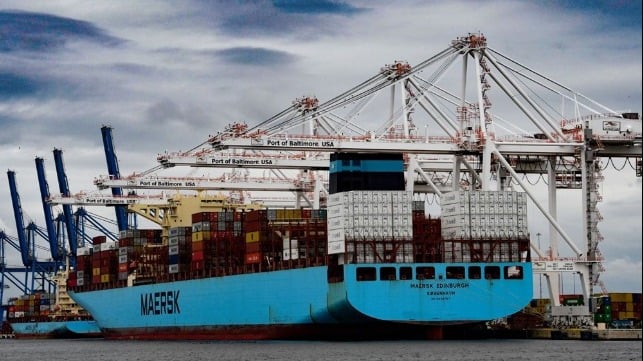Port of Baltimore Sets Record for Container Moves as it Expands

While attention has been focused on the strong container volume increases experienced at the West Coast ports, the U.S. East Coast Ports have also been experiencing strong volume increases starting in mid-2020 and continuing into the new year. Last week, the Port of Baltimore set a new record for container moves as the port takes steps to expand its capacity.
The Helen Delich Bentley Port of Baltimore set a record at the Seagirt Marine Terminal for the most ever container moved from a single ship. The 13,000 TEU Maersk Edinburgh arrived at the terminal on February 8 and when it departed four days later a total of 6,000 container moves had been completed. Moves include the number of containers unloaded or loaded to the vessel and surpassed the previous high mark of 5,536 moves, also from the Maersk Edinburgh in August 2020.
The new record is part of a notable rebound in container volumes at the port from low points last spring when the COVID-19 pandemic impacted trade. According to port officials as of the December reporting period, container volume at the Port of Baltimore was up 12 percent compared to low points last spring, and up 6 percent year-over-year compared to December 2019. It was the third consecutive month for year-over-year gains and the sixth consecutive month for a double-digit gain.
Contributing to Baltimore’s volume increases were 13 ad hoc ship calls, or extra loaders, added to the port’s schedule since mid-July. In total, they contributed 18,000 TEUs to the volume.
Further adding to the port’s volume, late this year the Finnish forest products company Metsa Group will consolidate all its Mid-Atlantic volumes through the Port of Baltimore bringing more than 370,000 tons of pulp used to produce paper and forest products used to produce packaging material through the port and using at least three warehousing structures that have been underutilized or vacant for the past five years.
“E-commerce continues to be a driving factor in our recovery,” said William P. Doyle, executive director of the Maryland Department of Transportation Maryland Port Administration (MDOT MPA). “The Port of Baltimore is surrounded by many of the region’s distribution, fulfillment, and sorting centers. With consumers making more online purchases during the pandemic, that’s resulting in strong container gains for us.”
Helping the port to accommodate the growing traffic, a container repair depot operated by Ports America Chesapeake was recently relocated to an off-dock location to provide additional space for container handling at the dock and improve overall operational efficiencies for truckers. The space gained by relocating container maintenance and repair will also allow for the development of an additional gate complex, providing a more fluid container delivery and pick-up experience.

that matters most
Get the latest maritime news delivered to your inbox daily.
“Moving the container repair depot gives us space we need to accommodate the volumes coming to the Port now and in the future,” said Slater. “It’s a move that strengthens the ability as we continue to experience very strong container growth, driven by consumer purchasing. As we work toward being able to handle massive ships simultaneously and double-stacking containers on trains through the Howard Street Tunnel, this extra space will be a great asset.”
The Port of Baltimore is also using its public-private partnership with partner Ports America Chesapeake to open a new 50-foot deep berth at the Seagirt Marine Terminal. It will allow the Port to handle two supersized ships at the same time. Four new Neo-Panamax cranes are scheduled to arrive in July and will be operational later this year to support the new berth.
